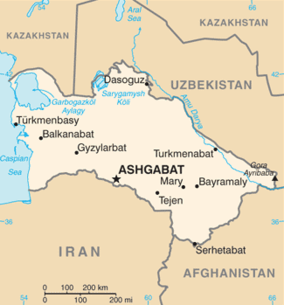Badhyz State Nature Reserve
| Badhyz State Nature Reserve | |
|---|---|
 | |
 | |
| Location | Mary Province, |
| Nearest city | Tejen |
| Area | 877 km2 (339 sq mi) |
| Established | 1941 |
The Badhyz State Nature Reserve (Turkmen: Bathyz goraghanasy) is a protected area (zapovednik) in south-western Turkmenistan that was established in 1941 and extends over 877 km2 (339 sq mi) in the Mary and Akhal Provinces. It is located south of the Karakum Desert, and the Tejen River forms its western border.[1]
Its landscape comprises solitary or groups of foothills, ranging in height from 20 to 200 m. The average annual precipitation of the reserve is about 280 mm, with a maximum of 420 mm and a minimum of 130 mm. Its short spring is followed by a long hot summer with 4–5 months of hot weather and little cooling winds.[citation needed]
It also incorporates three wildlife sanctuaries (zakaznik), which were established in 1956:
Fauna
[edit]The Badhyz State Nature Reserve is an important stronghold of the Asiatic wild ass (Equus hemionus kulan). It was once the last place where the Turkmenian wild ass was found. The wild ass population increased from 200, when the reserve was founded to 5000 animals. After a strong decline, there are now about 650 wild ass in the sanctuary.[2]
Other ungulates present in this protected area are urial, goitered gazelle and wild boar. Predators include red fox, Persian leopard, striped hyena, grey wolf, and Asiatic wildcat.[1]
The Asiatic cheetah also used to occur in the nature reserve.[3] It has not been recorded in the region since the 1960s, and dispersal of individuals from neighbouring Iran is obstructed by the fenced border between the two countries.[1]
References
[edit]- ^ a b c Kaczensky, P. and Linnell, J. D. C. (2014). Rapid assessment of the mammalian community of the Badhyz Ecosystem, Turkmenistan, October 2014. NINA Report 1148. Trondheim: Norwegian Institute for Nature Research.
- ^ Moehlman, P. D. (ed). (2002). Equids: Zebra, Asses, and Horses. Status Survey and Conservation Action Plan. IUCN/SSC Equid Specialist Group., Gland, Switzerland and Cambridge, UK.
- ^ Heptner, V. G., Sludskij, A. A. (1992) [1972]. "Cheetah, Pardus". Mlekopitajuščie Sovetskogo Soiuza. Moskva: Vysšaia Škola [Mammals of the Soviet Union. Volume II, Part 2. Carnivora (Hyaenas and Cats)]. Washington DC: Smithsonian Institution and the National Science Foundation. pp. 702–733.
{{cite book}}: CS1 maint: multiple names: authors list (link)
- National Program for the Protection of the Environment, Ashgabat, 2002, pp. 149–151 (in Russian)
External links
[edit]- https://web.archive.org/web/20090609072344/http://natureprotection.gov.tm/reserve_tm.html
- http://www.birdlife.org/datazone/species/index.html?action=SitHTMDetails.asp&sid=22112&m=0
35°52′00″N 61°40′00″E / 35.8667°N 61.6667°E
